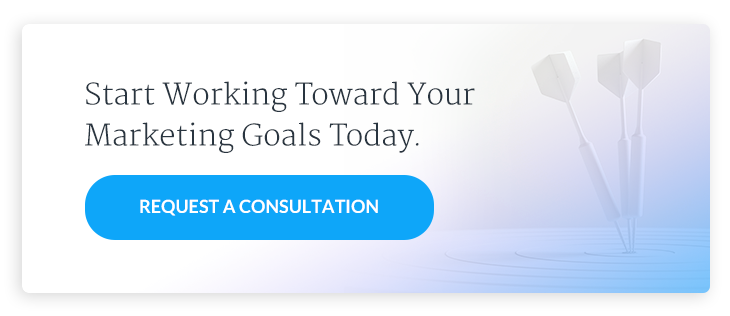
Content Marketing AI in 2022: What You Can Expect

Since scientists introduced the first robots in the mid-1900s, we’ve been hurtling toward an increasingly automated society. Today, we leverage artificial intelligence (AI) in healthcare, agriculture, finance, security and up and down the entire supply chain. We have self-driving cars, robotic surgery, automated investing and AI that can detect toxins and nutrient deficiencies in soil to assist with crop planning.
And, as you may have already experienced, AI can help us become better content marketers too.
Over the past few years, content marketing AI tools have become significantly more sophisticated, prevalent and accessible. These solutions claim to help businesses save money, scale marketing efforts, find and target new audiences and, in some cases, replace human labor altogether. But, does existing content marketing AI live up to these lofty promises? And is it worth the investment?
Today, we’re diving into the current state of AI for content marketing and exploring how this rapidly evolving tech can impact outcomes.
What Is Content Marketing AI, Exactly?
Content marketing AI refers to a collection of software solutions that leverage machine learning to automate various content creation, strategy, and distribution-related tasks.
For example, AI tools can help identify content topics, improve SEO, uncover trends relevant to your audience, and write headlines, ad copy, and social media captions. Some solutions can create entire videos, graphics or blog posts from a simple prompt or a string of keywords (although whether they can achieve the same quality as a skilled human creative is still up for debate.)
Like most automation software, these tools were designed to help marketing teams save time on routine tasks and streamline processes so they can refocus their energy on big-picture efforts. But their success depends largely on the application, your expectations and how you fit AI tech into your overall workflow.
What Can Content Marketing AI Do?
The increasing drive for efficiency is typically what draws marketing pros to AI software. As audiences’ desire for fresh and timely content surges, so does the pressure on marketing teams to deliver. But unless you’ve found a way to clone your entire team, keeping up with demand is quickly becoming impossible without AI.
But most marketing pros have been using automation to handle some facet of their efforts for a while. Software like HubSpot has long featured tools that generate content ideas, automatically promote new content pieces across social media, and tailor outreach based on lead behavior. There is no shortage of tools that leverage first- and third-party data to enhance audience targeting, and AI chatbots have been commonplace for years.
If you’re new to this tech, then the idea of passing off repetitive, menial duties so you can put more energy into things you’re more passionate about (or scale efforts without additional headcount) probably sounds too good to be true. But, as AI continues to improve, these outcomes are less far-fetched.
Here are a few ways AI can help you with your content marketing efforts right now:
- Automate routine tasks: Existing tech can send emails or direct messages to leads and clients based on specific triggers, gather data and generate reports to help inform your campaigns, and automatically suggest content to prospects based on previous behaviors.
- Create blog outlines: AI copywriting tools have come a long way. And while much of the bot-written content is still missing critical nuance, it’s an excellent solution for busting through writer’s block. Existing software, like Copysmith, can help you generate outlines, and tools like Wordtune can provide suggestions for more engaging versions of sentences and paragraphs when you’re stuck.
- Get suggestions to optimize copy: You never want to spend your precious time and effort creating a piece of content you think is optimized for search, only to see it flop after it's published. AI SEO tools like Alli AI can help identify opportunities within blog posts, website copy, and other content assets to help them perform better and claim a better position on search engine results pages.
- Identify trends and tags to boost performance: Trending topics on social media change by the hour, and attempting to keep up or get ahead can often feel futile. Current AI tools, like Lately, can help you identify topics to focus on, recommend hashtags to boost performance, and even suggest social media copy using your brand voice.
The next generation of AI is building upon existing functionality. Thanks to more robust machine learning, AI is becoming more accurate in identifying audiences to target, determining which content performs best for specific segments and crafting content that sounds more natural (and eerily) human.
What AI Can’t Do
Of course, while content marketing AI is quickly advancing, it’s still missing one crucial element: humanity.
Like a deepfake video, content written or designed by AI software just feels off. Even those solutions that learn from your existing assets and strive to replicate your brand’s voice can feel cold, distant, and a little odd. That’s because you can’t code authentic social and emotional intelligence into an algorithm (at least, not yet.) And, no matter how robust the technology behind your creative efforts, you still need genuine human storytelling and natural human empathy to create the sort of meaningful, moving content that drives action.
Additionally, AI is limited to the patterns available within its given parameters. “Because neural networks do not understand, let alone incorporate, outside context, they are unable to make adjustments based on social norms and interactions beyond the realm of their specific purpose and data set,” writes Katharine Schwab in an article for Fast Company.
So, what’s the answer?
AI will only become more integrated into our work, so it’s a good idea to familiarize yourself with this tech now, especially when many teams are working leaner than usual and struggling to source top talent. But while AI is an excellent supplement, and using it to the best of its abilities can help you work more efficiently, it’s not a replacement for human talent.
For now, aim to leverage content marketing AI to streamline your workflow and optimize your content but leave the more complex creative work to living, breathing marketing pros.




